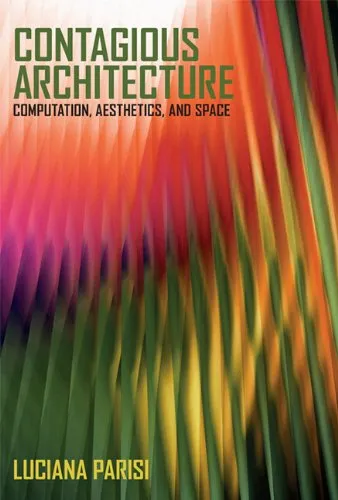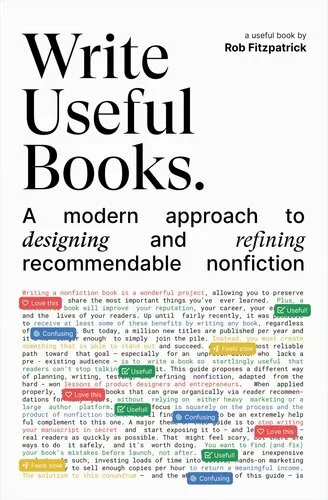Contagious Architecture: Computation, Aesthetics, and Space
4.0
بر اساس نظر کاربران

شما میتونید سوالاتتون در باره کتاب رو از هوش مصنوعیش بعد از ورود بپرسید
هر دانلود یا پرسش از هوش مصنوعی 2 امتیاز لازم دارد، برای بدست آوردن امتیاز رایگان، به صفحه ی راهنمای امتیازات سر بزنید و یک سری کار ارزشمند انجام بدینکتاب های مرتبط:
معرفی کتاب
کتاب "Contagious Architecture: Computation, Aesthetics, and Space" نوشتهی لوسیانا پاریسی، به بررسی کامپیوتر و معماری بهعنوان یک سیستم زیباییشناختی پیچیده میپردازد. این کتاب سعی دارد رابطه بین الگوریتمها و تأثیرات آنها بر فضای معماری را بررسی کند و دریچهای جدید به سمت فهم زیباییشناسی دیجیتال باز کند.
خلاصهای از کتاب
این کتاب به بررسی چگونگی استفاده از computation در فرآیند طراحی و امکانپذیر ساختن تعاملات جدید بین اجزای مختلف معماری میپردازد. پاریسی ادعا میکند که معماری مدرن باید بیش از یک سیستم ساختاری و زیباییشناختی اندیشیده شود، بلکه باید بهمثابه یک موجود زنده بررسی گردد که در تعامل دائم با surrounding environment خود تغییر و تحول مییابد.
پاریسی با بررسی الگوریتمها و دگرگونیهای خودسازماندهیشان، پیشنهاد میکند که این ساختارها میتوانند به شکل چشمگیری بر روی فضای فیزیکی و زندگی انسانی تأثیر بگذارند. او به جای تأکید بر دستاوردهای فنی، به ماهیت پیچیده و تفکری که شکلگیری الگوریتمها را امکانپذیر میسازد، میپردازد.
نکات کلیدی
- لزوم درک معماری بهعنوان یک سیستم زنده که تحت تأثیر الگوریتمها و فرآیندهای محاسباتی قرار دارد.
- تأکید بر اهمیت همکاری بین انسان و ماشین در فرآیند طراحی معماری.
- بررسی چگونگی تأثیر phygital (physical + digital) بر فضای شهری و تعاملات اجتماعی.
- فراخوانی به ادغام زیباییشناسی و علوم محاسباتی برای خلق فضایی جدید و نوآورانه.
جملات معروف از کتاب
"معماری خود نتیجة یک سیستم محاسباتی است که در حال تعامل با محیط پیرامونی و انسانیاش است".
"زیبایی در پیچیدگی نهفته است و پیچیدگی در بینهایت interaction میان مقادیر دیجیتال و فضا".
چرا این کتاب اهمیت دارد
کتاب "Contagious Architecture" به معماران، طراحان و پژوهشگران فرصتی میدهد تا به نحوه نوینی به فضای شهری و طراحی آن بیاندیشند. اهمیت این کتاب در ایجاد چشماندازهای جدیدی برای شهرهای هوشمند آینده و بررسی چگونگی تأثیر گذاری فضای phygital بر زندگی انسانی نهفته است. لوسیانا پاریسی به کمک ترکیب فناوری محاسباتی و زیباییشناسی، راهکارهای نوظهوری برای تعامل میان انسان و محیط زیست ارائه میدهد که بیشک به تحول در حوزه معماری و طراحی شهری منجر خواهد شد.
Welcome to an exploration of the intersections between computation, aesthetics, and spatial dynamics as presented in the transformative book, Contagious Architecture: Computation, Aesthetics, and Space by Luciana Parisi.
Detailed Summary of the Book
In Contagious Architecture, Luciana Parisi delves into the intricate relationship between computation and aesthetics, offering a deep analysis of how these elements redefine architectural space. The book dissects the evolution of computational processes and how they shape the aesthetics of architecture in a way that influences not just the visual outcome, but fundamentally the conceptualization of space itself.
Parisi embarks on an intellectual journey to illustrate how algorithms exceed mere functionality to become agents of aesthetic change. Her work eschews traditional architectural narratives, instead framing computation as a dynamic material process capable of generating unpredictable forms. She explores the nuances of algorithmic processes, spatial complexities, and the emergent behaviors of computational systems, positioning them as active participants in the artistic creation of architectural structures.
This book extends the conversation beyond the conventional parameters, inviting readers to consider computational architecture as an evolving form of digital thought. Parisi challenges the boundaries of control and determinism in architectural design, proposing a model where architectural aesthetics are seen as a contingent and emergent property of computation.
Key Takeaways
- The book redefines computation as an aesthetic and architectural tool, rather than merely a technical one.
- Parisi argues for appreciating algorithms as active agents that introduce novelty and unpredictability in architectural design.
- There is an emphasis on how computational processes influence the conceptualization and realization of spatial structures, proposing a shift from deterministic to emergent properties.
- The insights invite further contemplation on the implications of algorithms as drivers of creative practices in architecture.
Famous Quotes from the Book
"Computation is not a mere resource for architectural design, but a generator of unpredictable architectural outcomes."
"The aesthetics of computation reveal a space where control is obsolete, and emergence takes precedence."
"By acknowledging algorithms as aesthetic agents, we open the door to an architecture that is perpetually evolving."
Why This Book Matters
Luciana Parisi's Contagious Architecture holds a significant place in contemporary architectural and computational discourse. By challenging the perception of computation through the lens of aesthetics and space, it pushes the boundaries of traditional architecture and design thought. This book matters because it offers a fresh perspective on how digital processes are reshaping the cultural and intellectual frameworks of architecture. It strengthens the dialogue regarding the potential of computation as a key player in art and architecture, urging readers and practitioners alike to embrace the intrinsic creative possibilities present within algorithms.
Furthermore, Parisi's work enriches the broader field of digital aesthetics, suggesting new pathways for interdisciplinary research and innovation. As a thought leader in this area, her contributions prompt a rethinking of the critical role that emergent technology plays in shaping not only visual outputs but also the underlying philosophy of space-making.
دانلود رایگان مستقیم
شما میتونید سوالاتتون در باره کتاب رو از هوش مصنوعیش بعد از ورود بپرسید
دسترسی به کتابها از طریق پلتفرمهای قانونی و کتابخانههای عمومی نه تنها از حقوق نویسندگان و ناشران حمایت میکند، بلکه به پایداری فرهنگ کتابخوانی نیز کمک میرساند. پیش از دانلود، لحظهای به بررسی این گزینهها فکر کنید.
این کتاب رو در پلتفرم های دیگه ببینید
WorldCat به شما کمک میکنه تا کتاب ها رو در کتابخانه های سراسر دنیا پیدا کنید
امتیازها، نظرات تخصصی و صحبت ها درباره کتاب را در Goodreads ببینید
کتابهای کمیاب یا دست دوم را در AbeBooks پیدا کنید و بخرید
1542
بازدید4.0
امتیاز0
نظر98%
رضایتنظرات:
4.0
بر اساس 0 نظر کاربران
Questions & Answers
Ask questions about this book or help others by answering
No questions yet. Be the first to ask!














